You are using an out of date browser. It may not display this or other websites correctly.
You should upgrade or use an alternative browser.
You should upgrade or use an alternative browser.
Export thread
Handheld Power Equipment WARRANTIES
#1

lawn mower fanatic
lawn mower fanatic
When you are looking at buying handheld power equipment like trimmers, edgers, blowers, and the like, one thing to take into consideration is the products' warranty. Different brands have different length warranties, and they differ from consumer to commercial. Here is a list of some of the major brands' warranties.
---Echo Power Equipment
Echo offers a 5 year consumer, 2 year commercial warranty.
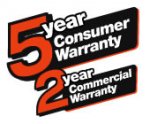 Best Consumer Warranty Longest Commercial Warranty | ECHO USA
Best Consumer Warranty Longest Commercial Warranty | ECHO USA
---Stihl Power Equipment
Stihl offers a one or two year consumer warranty on most of their equipment. Their commercial warranty ranges from 90 days to 2 years, depending on the product. Look at the specifics here:
 STIHL Products Limited Warranty Information | STIHL USA
STIHL Products Limited Warranty Information | STIHL USA
They also offer an incentive where if you purchase a 6-pack of oil when you purchase your piece of equipment it will double your warranty! :thumbsup: Other brands might also have this.
 STIHL Engine Oil - Ultra Limited Warranty Information | STIHL USA
STIHL Engine Oil - Ultra Limited Warranty Information | STIHL USA
---Tanaka Power Equipment
Tanaka has a really long warranty! 7 year consumer, 2 year commercial! :thumbsup:
 Warranty Info
Warranty Info
---Other Brands
Here are some other brands' warranties.

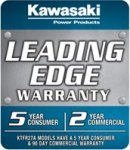 Leading Edge Warranty | Kawasaki - Engines, Replacement Parts, and Power Products
Leading Edge Warranty | Kawasaki - Engines, Replacement Parts, and Power Products

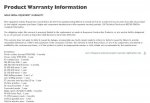 Product Warranty Information
Product Warranty Information
***I do not guarantee the warranty information above is 100% accurate. If you are making a purchase decision on the length of the warranty, I would check with your local dealer to get more information.
---Echo Power Equipment
Echo offers a 5 year consumer, 2 year commercial warranty.
 Best Consumer Warranty Longest Commercial Warranty | ECHO USA
Best Consumer Warranty Longest Commercial Warranty | ECHO USA---Stihl Power Equipment
Stihl offers a one or two year consumer warranty on most of their equipment. Their commercial warranty ranges from 90 days to 2 years, depending on the product. Look at the specifics here:
 STIHL Products Limited Warranty Information | STIHL USA
STIHL Products Limited Warranty Information | STIHL USAThey also offer an incentive where if you purchase a 6-pack of oil when you purchase your piece of equipment it will double your warranty! :thumbsup: Other brands might also have this.
 STIHL Engine Oil - Ultra Limited Warranty Information | STIHL USA
STIHL Engine Oil - Ultra Limited Warranty Information | STIHL USA---Tanaka Power Equipment
Tanaka has a really long warranty! 7 year consumer, 2 year commercial! :thumbsup:
---Other Brands
Here are some other brands' warranties.
 Leading Edge Warranty | Kawasaki - Engines, Replacement Parts, and Power Products
Leading Edge Warranty | Kawasaki - Engines, Replacement Parts, and Power Products
 Product Warranty Information
Product Warranty Information***I do not guarantee the warranty information above is 100% accurate. If you are making a purchase decision on the length of the warranty, I would check with your local dealer to get more information.
#2

djdicetn
djdicetn
lmf,
Good information....and I agree one of the most important factors I consider for purchases!! I'm still leaning towards the Echo backpack blowers because of (a)the warranty and (b)the gutter kit works for other than their handheld blower models. Also, didn't know about the Stihl oil purchase/double warranty. Good to know!! I still haven't found any other brand blowers(Redmax is still a "maybe") that advertise the gutter kit works with their backpack models:0(
Good information....and I agree one of the most important factors I consider for purchases!! I'm still leaning towards the Echo backpack blowers because of (a)the warranty and (b)the gutter kit works for other than their handheld blower models. Also, didn't know about the Stihl oil purchase/double warranty. Good to know!! I still haven't found any other brand blowers(Redmax is still a "maybe") that advertise the gutter kit works with their backpack models:0(
#3

lawn mower fanatic
Yeah, I think Echo is a good brand for your needs. What model would you be looking at, the PB-500H, PB-500T, or another model?
The only difference between the 500H and 500T is the location of the throttle.
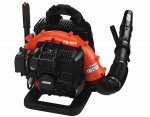
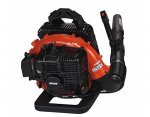
PB-500H: ECHO PB-500H Emission-Compliant Hip-Mounted Throttle Backpack Leaf Blower - ECHO USA | ECHO USA
PB-500T: ECHO PB-500H Emission-Compliant Tube-Mounted Throttle Backpack Leaf Blower - ECHO USA | ECHO USA
lawn mower fanatic
lmf,
Good information....and I agree one of the most important factors I consider for purchases!! I'm still leaning towards the Echo backpack blowers because of (a)the warranty and (b)the gutter kit works for other than their handheld blower models. Also, didn't know about the Stihl oil purchase/double warranty. Good to know!! I still haven't found any other brand blowers(Redmax is still a "maybe") that advertise the gutter kit works with their backpack models:0(
Yeah, I think Echo is a good brand for your needs. What model would you be looking at, the PB-500H, PB-500T, or another model?
The only difference between the 500H and 500T is the location of the throttle.


PB-500H: ECHO PB-500H Emission-Compliant Hip-Mounted Throttle Backpack Leaf Blower - ECHO USA | ECHO USA
PB-500T: ECHO PB-500H Emission-Compliant Tube-Mounted Throttle Backpack Leaf Blower - ECHO USA | ECHO USA
#4

Ric
The warranty is a real good thing to look for when buying any equipment but better than the warranty would be a dealer that you trust and will back it up. Often times warranty's are pushed to being the fault of the consumer.
You mention the Echo Backpack blowers and this is just my opinion but if you buy the Echo stay away from any of the Hip mount throttles they're a PITA stay with the tube.
Ric
lmf,
Good information....and I agree one of the most important factors I consider for purchases!! I'm still leaning towards the Echo backpack blowers because of (a)the warranty and (b)the gutter kit works for other than their handheld blower models. Also, didn't know about the Stihl oil purchase/double warranty. Good to know!! I still haven't found any other brand blowers(Redmax is still a "maybe") that advertise the gutter kit works with their backpack models :0(
The warranty is a real good thing to look for when buying any equipment but better than the warranty would be a dealer that you trust and will back it up. Often times warranty's are pushed to being the fault of the consumer.
You mention the Echo Backpack blowers and this is just my opinion but if you buy the Echo stay away from any of the Hip mount throttles they're a PITA stay with the tube.
#5

Ric
LMF Have you ever heard the 550T run?
Ric
Yeah, I think Echo is a good brand for your needs. What model would you be looking at, the PB-500H, PB-500T, or another model?
The only difference between the 500H and 500T is the location of the throttle.
LMF Have you ever heard the 550T run?
#6

pugaltitude
pugaltitude
Personally i wouldnt worry to much with warranty when buying a machine.
Its just a sales gimmick.
A warranty issue usually happens in the 1st hour of equipment being used.
After the hour then 9 out 10 times its usually end user fault.
To qualify for warranty you will need to have your equipment serviced every year by a dealer and use genuine Parts.
2stroke product is only really designed for a 3-5 year life cycle.
What this means is it will perform at an optimum level in this period before faults start to occur.
Buy from a dealer and they will usually look after depending how much money you spend in a
year. :laughing:
Its just a sales gimmick.
A warranty issue usually happens in the 1st hour of equipment being used.
After the hour then 9 out 10 times its usually end user fault.
To qualify for warranty you will need to have your equipment serviced every year by a dealer and use genuine Parts.
2stroke product is only really designed for a 3-5 year life cycle.
What this means is it will perform at an optimum level in this period before faults start to occur.
Buy from a dealer and they will usually look after depending how much money you spend in a
year. :laughing:
#8
P
possum
P
possum
Problem with warranty is seldom is it understood before the money is already paid and the unit gassed up and running by the owner. As often as not it is not even understood until the unit has a malfunction and then half the folks still do not get it. Carbs seem to be made of poor metals these days, and most carb trouble is not covered at all or not very well. Folks get upset when the cheap homeline stuff cost half the cost of the unit to repair a carb and they pay for it or do not get the unit back. Service centers pretty much know what is wrong with a unit and do not want to work on them beause the real cheap stuff is not worth it and they fear they will not get paid by the owner. They need some protection in the form of a fee to look it over. Most of the time on the lower end the best warranty is the store that you purchased it from will let you return it for thirty days. Some will not. Lower end items are often refused by the tech as well because the owner simply ran it to long. There is always a good many items parked at Lowes returned within the 30 days that have been run very long and hard from the looks of them and then returned. Several string trimmers I loked over last fall had a note on them saying the owner returned it because it was uncomfortable, to heavy, made their hands go numb etc. They had the look of some long hard days one after another.
#9

robert@honda
robert@honda
The warranty on Honda trimmers is 24 months for residential customers, 12 months for commercial users. The drive shaft has a lifetime warranty, but only for the original retail customer. All other aspects of the warranty will transfer with ownership.
Full details here: Distributor's Limited Warranty
Full details here: Distributor's Limited Warranty
#10

djdicetn
I too am curious why...the Echo PB550T is rated at 70db, same as the Stihl BR200. Are the specs not "accurate"? Or does the "basic sound" of the engine itself fall into an "irritating" frequency versus other brands. LMF....yeah, even without the comment from ric, I was onlu interested in a tube-mounted throttle.
djdicetn
Ric,No, why? :redface:
I too am curious why...the Echo PB550T is rated at 70db, same as the Stihl BR200. Are the specs not "accurate"? Or does the "basic sound" of the engine itself fall into an "irritating" frequency versus other brands. LMF....yeah, even without the comment from ric, I was onlu interested in a tube-mounted throttle.
#11

Ric
Yes I would say that they are accurate. If you stop and think about it The 550 is 465cfm the 200 406cfm. The 550 is rated at 163 mph average the 200 is 132 mph average and both are 70dba so in reality there pretty close as far as cfm goes and sound and there is a little difference in air velocity although not that much. The thing I look at and the big difference between the two is the Echo uses a 50.8 cc engine to produce it's spec's while the Stihl uses a 27.2cc engine. What's wrong with that picture????:smile::smile:
As for my comment about hearing one run......... I came home the other day after doing some of my lawns and was in my garage watching some tv while I was cleaning a trimmer and heard an ungodly noise and couldn't figure out what it was so I opened the door to look and across the street there was a guy from one of the other Lawncare outfits clearing a driveway and he was using a 500T and I swear I could have stood next to him with my BR 500 running and you wouldn't have been able to hear my 500 running that thing was so loud. That 500t sounded absolutely terrible. Now I will say it was doing a kick butt job but I would have for sure had muffs with that thing.
Ric
Ric,
I too am curious why...the Echo PB550T is rated at 70db, same as the Stihl BR200. Are the specs not "accurate"? Or does the "basic sound" of the engine itself fall into an "irritating" frequency versus other brands. LMF....yeah, even without the comment from ric, I was onlu interested in a tube-mounted throttle.
Yes I would say that they are accurate. If you stop and think about it The 550 is 465cfm the 200 406cfm. The 550 is rated at 163 mph average the 200 is 132 mph average and both are 70dba so in reality there pretty close as far as cfm goes and sound and there is a little difference in air velocity although not that much. The thing I look at and the big difference between the two is the Echo uses a 50.8 cc engine to produce it's spec's while the Stihl uses a 27.2cc engine. What's wrong with that picture????:smile::smile:
As for my comment about hearing one run......... I came home the other day after doing some of my lawns and was in my garage watching some tv while I was cleaning a trimmer and heard an ungodly noise and couldn't figure out what it was so I opened the door to look and across the street there was a guy from one of the other Lawncare outfits clearing a driveway and he was using a 500T and I swear I could have stood next to him with my BR 500 running and you wouldn't have been able to hear my 500 running that thing was so loud. That 500t sounded absolutely terrible. Now I will say it was doing a kick butt job but I would have for sure had muffs with that thing.
#12

lawn mower fanatic
lawn mower fanatic
Good input, Ric. I think if the blower is doing a "kick butt job" it is worth it to get a pair of headphones, since the blower is so good. Not a big deal IMO. But yes, some blowers are LOUD!
#13

Ric
Yeah it was loud but it was way to loud, I think it needed a trip to the shop Badly. There was something that was definitely not right.
Ric
Good input, Ric. I think if the blower is doing a "kick butt job" it is worth it to get a pair of headphones, since the blower is so good. Not a big deal IMO. But yes, some blowers are LOUD!
Yeah it was loud but it was way to loud, I think it needed a trip to the shop Badly. There was something that was definitely not right.
#14

lawn mower fanatic
Well if there was something wrong with that SPECIFIC blower, then there is no reason why it still shouldn't be considered, correct? It's not like EVERY PB-500T blower sounds that way!
lawn mower fanatic
Yeah it was loud but it was way to loud, I think it needed a trip to the shop Badly. There was something that was definitely not right.
Well if there was something wrong with that SPECIFIC blower, then there is no reason why it still shouldn't be considered, correct? It's not like EVERY PB-500T blower sounds that way!
#15

Ric
Yeah, I mean I know that the echo blowers are louder than the Stihls due to the Stihls being a 4 mix vs the Echo being a 2 Stroke but this thing honestly rattled really load, I thought at the time it sounded like the piston was coming out of the thing. I also have an idea that this particular guy didn't do a whole lot of maintenance on any of his equipment the way it looked.
Ric
Well if there was something wrong with that SPECIFIC blower, then there is no reason why it still shouldn't be considered, correct? It's not like EVERY PB-500T blower sounds that way!
Yeah, I mean I know that the echo blowers are louder than the Stihls due to the Stihls being a 4 mix vs the Echo being a 2 Stroke but this thing honestly rattled really load, I thought at the time it sounded like the piston was coming out of the thing. I also have an idea that this particular guy didn't do a whole lot of maintenance on any of his equipment the way it looked.
#16

lawn mower fanatic
Well that will cost him time and money in the long run! :confused3:
lawn mower fanatic
I also have an idea that this particular guy didn't do a whole lot of maintenance on any of his equipment the way it looked.
Well that will cost him time and money in the long run! :confused3:
#17
M
moodypower
M
moodypower
Shindaiwa has expanded its warranty for residential customers to 5 years -- still 2 years commercial. At least in Canada.
The warranty for Echo includes a lifetime warrantly on the shaft and ignition. Since the engines are dependable, generally the problems we see are related to bad mix or gas that has been left in the machine and deteriorated to jelly or varnish.
The warranty for Echo includes a lifetime warrantly on the shaft and ignition. Since the engines are dependable, generally the problems we see are related to bad mix or gas that has been left in the machine and deteriorated to jelly or varnish.
#18

Ric
You'll find that since Echo purchased Shindaiwa that most likely have all the same warranty's.
Ric
Shindaiwa has expanded its warranty for residential customers to 5 years -- still 2 years commercial. At least in Canada.
The warranty for Echo includes a lifetime warrantly on the shaft and ignition. Since the engines are dependable, generally the problems we see are related to bad mix or gas that has been left in the machine and deteriorated to jelly or varnish.
You'll find that since Echo purchased Shindaiwa that most likely have all the same warranty's.
#19

MowerMike
MowerMike
You need to read the fine print carefully. Many warranties only cover the main engine components such as the crankshaft assembly and will not cover carburetor problems or anything fuel related. Many warranties will be voided by anything deemed improper maintenance or abuse. Also, they don't cover "normal wear and tear." Did you leave fuel containing any ethanol in the fuel tank for more than thirty days ? Even with fuel stabilizers and ethanol treatments, your warranty may be voided if you didn't follow all the maintenance requirements religiously.
The fact is that a warranty is only as good as the company backing it. Husqvarna had a rash of bad fuel lines in their blowers that would break and crumble after a few months, but refused to warranty them because they were deemed to be fuel related. Hitachi, which is the same brand as Tanaka and has the same 7 year warranty had a similar problem about a year ago, and did the same thing. So, I try to buy from a local store, which will allow a return for a full refund or replacement in the first 30 days and wring the tool out in that time to make sure it has no defects. Also, I stay away from really low end junk brands like Homelite, with their cheap half crankshaft engines.
The fact is that a warranty is only as good as the company backing it. Husqvarna had a rash of bad fuel lines in their blowers that would break and crumble after a few months, but refused to warranty them because they were deemed to be fuel related. Hitachi, which is the same brand as Tanaka and has the same 7 year warranty had a similar problem about a year ago, and did the same thing. So, I try to buy from a local store, which will allow a return for a full refund or replacement in the first 30 days and wring the tool out in that time to make sure it has no defects. Also, I stay away from really low end junk brands like Homelite, with their cheap half crankshaft engines.
#20

Mid TN Lawn
Mid TN Lawn
Shindaiwa / echo warranties are a joke they blame everything on fuel i had to pay 5.00 for a new primer bulb to go in a 5 month old blower. Shindaiwa has fought repair on trimmers saying fuel related. Would like to know if othet manufacturers give this problem.You need to read the fine print carefully. Many warranties only cover the main engine components such as the crankshaft assembly and will not cover carburetor problems or anything fuel related. Many warranties will be voided by anything deemed improper maintenance or abuse. Also, they don't cover "normal wear and tear." Did you leave fuel containing any ethanol in the fuel tank for more than thirty days ? Even with fuel stabilizers and ethanol treatments, your warranty may be voided if you didn't follow all the maintenance requirements religiously. The fact is that a warranty is only as good as the company backing it. Husqvarna had a rash of bad fuel lines in their blowers that would break and crumble after a few months, but refused to warranty them because they were deemed to be fuel related. Hitachi, which is the same brand as Tanaka and has the same 7 year warranty had a similar problem about a year ago, and did the same thing. So, I try to buy from a local store, which will allow a return for a full refund or replacement in the first 30 days and wring the tool out in that time to make sure it has no defects. Also, I stay away from really low end junk brands like Homelite, with their cheap half crankshaft engines.
#21
D
davevfla
D
davevfla
Redmax blowers are untouchable by anything. I have a hodge podge of the best IMO redmax blower still edger, and Tanaka weedeater. The Tanaka is super light and comes with a 2 year commercial warranty 7 year homeowner. For $185 sent to the house. I have a still that sits in the trailer unused. Shindaiwa trimmers. I have been super impressed with the weedeater
#22

Ida-Boy
Ida-Boy
I just purchased a Dolmar weed trimmer and was told that the company has increased it warranty on the trimmer to 2 years not 1. Paperwork said 1 but seller insisted it is under 2 year warranty.
#23

lawn mower fanatic
DOLMAR - DOLMAR 2 Year Warranty Period
lawn mower fanatic
I just purchased a Dolmar weed trimmer and was told that the company has increased it warranty on the trimmer to 2 years not 1. Paperwork said 1 but seller insisted it is under 2 year warranty.
DOLMAR - DOLMAR 2 Year Warranty Period
#25

theresaantonio
theresaantonio
Great, thanks for sharing, appreciated!When you are looking at buying handheld power equipment like trimmers, edgers, blowers, and the like, one thing to take into consideration is the products' warranty. Different brands have different length warranties, and they differ from consumer to commercial. Here is a list of some of the major brands' warranties.
---Echo Power Equipment
Echo offers a 5 year consumer, 2 year commercial warranty.
View attachment 11499 Best Consumer Warranty Longest Commercial Warranty | ECHO USA
---Stihl Power Equipment
Stihl offers a one or two year consumer warranty on most of their equipment. Their commercial warranty ranges from 90 days to 2 years, depending on the product. Look at the specifics here:
View attachment 11502 STIHL Products Limited Warranty Information | STIHL USA
They also offer an incentive where if you purchase a 6-pack of oil when you purchase your piece of equipment it will double your warranty!Other brands might also have this.
View attachment 11501 STIHL Engine Oil - Ultra Limited Warranty Information | STIHL USA
---Tanaka Power Equipment
Tanaka has a really long warranty! 7 year consumer, 2 year commercial!
View attachment 11503 Warranty Info
---Other Brands
Here are some other brands' warranties.
View attachment 11506 View attachment 11500 Leading Edge Warranty | Kawasaki - Engines, Replacement Parts, and Power Products
View attachment 11505 View attachment 11504 Product Warranty Information
***I do not guarantee the warranty information above is 100% accurate. If you are making a purchase decision on the length of the warranty, I would check with your local dealer to get more information.
#26

Tiger Small Engine
Warranties are like insurance, they make people feel warm and fuzzy. People have been conditioned to buy extended warranties and insurance.
Who would buy an extended warranty on a $50 product? People do it all day long.
Who would buy insurance on a cell phone? Happens all the time.
That is where the good gross profit is for the company, warranty and insurance.
Tiger Small Engine
I have never taken an advantage of a warranty on any product I have ever purchased. Whether it be a $10 box fan or a $15,000 zero turn.Warranties for handheld power equipment, such as lawnmowers, leaf blowers, chainsaws, and trimmers, can vary depending on the manufacturer, model, and where the equipment was purchased. Here are some common aspects to consider regarding warranties for handheld power equipment:
It's crucial to thoroughly read and understand the warranty terms and conditions provided by the manufacturer. If you have any questions or concerns about the warranty coverage, don't hesitate to contact the manufacturer's customer support or the retailer where you purchased the equipment for clarification.
- Duration of Warranty:
- Most manufacturers offer warranties that typically range from one to five years for consumer-grade equipment. Commercial-grade equipment may have shorter warranties.
- Consumer vs. Commercial Use:
- Many warranties distinguish between consumer and commercial use. Commercial use can often result in shorter warranty periods.
- Limited vs. Full Warranty:
- Some warranties are limited, covering specific parts or issues, while others are full warranties, covering a wider range of repairs and issues.
- Registration:
- Some manufacturers require product registration within a certain period to activate the warranty. Be sure to follow any registration instructions provided with your equipment.
- Parts and Labor:
- Check whether the warranty covers both parts and labor for repairs or if it only covers parts. Some warranties may require you to cover labor costs.
- Routine Maintenance:
- Be aware that many warranties may require you to perform routine maintenance as specified in the equipment's manual. Failure to do so could void the warranty.
- Authorized Service Centers:
- Warranties often specify that repairs must be performed by authorized service centers or technicians to remain valid.
- Transportation Costs:
- Consider if the warranty covers transportation costs associated with getting your equipment to a service center for repairs.
- Exclusions and Limitations:
- Review the warranty's fine print for exclusions and limitations. Common exclusions may include wear and tear, damage due to misuse, and cosmetic issues.
- Third-Party Warranties:
- In some cases, third-party extended warranties may be available for purchase separately.
- Manufacturer Reputation:
- Consider the reputation of the manufacturer and its history of honoring warranties. Reading customer reviews and seeking recommendations can help gauge this.
- Retain Documentation:
- Keep all documentation related to your equipment purchase and warranty in a safe place. This includes the owner's manual, receipt, and any warranty cards or registration information.
Additionally, be proactive in maintaining your handheld power equipment by following the manufacturer's maintenance recommendations to help prevent issues and ensure warranty coverage, if needed.
Warranties are like insurance, they make people feel warm and fuzzy. People have been conditioned to buy extended warranties and insurance.
Who would buy an extended warranty on a $50 product? People do it all day long.
Who would buy insurance on a cell phone? Happens all the time.
That is where the good gross profit is for the company, warranty and insurance.
